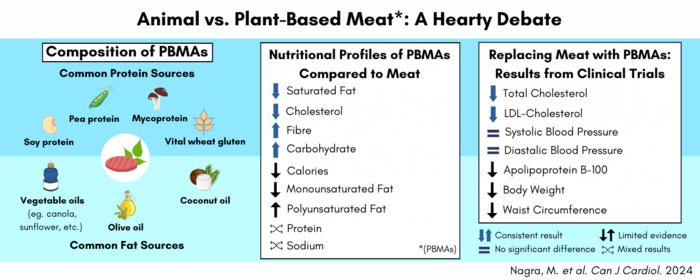Even though there is substantial variability in the contents and nutritional profiles of plant-based meat alternatives (PBMAs), the nutritional profiles tend to reflect a heart-healthy dietary pattern. A review article appearing in the Canadian Journal of Cardiology, published by Elsevier, of the available studies directly comparing the impact of plant-based and animal-based meats consistently suggests that the plant-based alternatives improve cardiovascular risk factors.
PBMAs are highly processed plant-based food products that typically replace meat in the diet. In Canada, the growing demand for PBMAs coincides with public health recommendations to reduce ultra-processed food consumption, which prompts the need to investigate the long-term health implications of PBMAs.
Lead author Matthew Nagra, ND, Vancouver, BC, Canada, says, “While the plant-based meat market has experienced significant growth in recent years and more and more Canadians are enjoying plant-based burgers, surprisingly little is known about how these meat alternatives may impact health and in particular cardiovascular disease risk. Thus, we sought to review the available literature on the topic to identify what is currently known and to provide direction for future research.”
The authors of the article reviewed the research published from 1970 to 2023 on PBMAs, their contents, nutritional profiles, and impact on cardiovascular disease risk factors, such as cholesterol levels and blood pressure. Their analysis shows:

Credit: Dr. Matthew Nagra, ND, and Felicia Tsam, RHN
Even though there is substantial variability in the contents and nutritional profiles of plant-based meat alternatives (PBMAs), the nutritional profiles tend to reflect a heart-healthy dietary pattern. A review article appearing in the Canadian Journal of Cardiology, published by Elsevier, of the available studies directly comparing the impact of plant-based and animal-based meats consistently suggests that the plant-based alternatives improve cardiovascular risk factors.
PBMAs are highly processed plant-based food products that typically replace meat in the diet. In Canada, the growing demand for PBMAs coincides with public health recommendations to reduce ultra-processed food consumption, which prompts the need to investigate the long-term health implications of PBMAs.
Lead author Matthew Nagra, ND, Vancouver, BC, Canada, says, “While the plant-based meat market has experienced significant growth in recent years and more and more Canadians are enjoying plant-based burgers, surprisingly little is known about how these meat alternatives may impact health and in particular cardiovascular disease risk. Thus, we sought to review the available literature on the topic to identify what is currently known and to provide direction for future research.”
The authors of the article reviewed the research published from 1970 to 2023 on PBMAs, their contents, nutritional profiles, and impact on cardiovascular disease risk factors, such as cholesterol levels and blood pressure. Their analysis shows:
- There is substantial variability in the contents and nutritional profiles of PBMAs.
- On average, PBMAs tend to have a more heart-healthy nutritional profile than meat, although the high sodium content of some products may be of concern.
- PBMAs have been shown to improve some cardiovascular risk factors, including cholesterol levels, in several randomized controlled trials.
- PBMAs have not been shown to raise blood pressure, despite the high sodium content of some products.
- There is currently a lack of long-term research evaluating how these alternatives may affect the risk of developing a heart attack or stroke.
- There is currently little research on the healthfulness of some common components of PBMAs, such as vital wheat gluten (seitan).
The authors of the review article were surprised to find that there is a near complete lack of research on vital wheat gluten, which is the primary protein source incorporated into many popular PBMAs, and cardiovascular risk factors.
Dr. Nagra continues, “Further, the lack of research on cardiovascular outcomes as of 2023 is shocking, given that there are randomized controlled trials evaluating risk factors dating back to 1990. More detailed research is needed in light of the increasing consumption of PBMAs and our lack of knowledge of how these products impact risk.”
In an accompanying editorial, J. David Spence, CM, MD, FRCPC, FAHA, Professor Emeritus of Neurology & Clinical Pharmacology, Western University, and Director, Stroke Prevention & Atherosclerosis Research Centre, Robarts Research Institute, London, ON, Canada, notes, “In an excellent review of PBMAs, Nagra et al. focus on reduction of cardiovascular risk factors, and the effects of various individual dietary factors on cardiovascular risk.”
However, Professor Spence points out that, “What really matters is not the effect of individual components of a diet, nor the effect of diet on cardiovascular risk factors; it is the effect of diet on the actual risk of cardiovascular events such as myocardial infarction and stroke. Most physicians markedly underestimate the cardiovascular benefit of diet and place far too little emphasis on diet in the management of patients at high risk of cardiovascular events.”
Senior author of the review article Ehud Ur, MB, FRCPC, Professor, Division of Endocrinology & Metabolism, University of British Columbia, Vancouver, BC, Canada, concludes, “For those looking to reduce their meat intake, especially if it’s red meat, replacing that with PBMAs is likely a heart-healthy choice. For those who already limit their meat intake, PBMAs can be incorporated into a healthy dietary pattern as an excellent protein source; however, it may be beneficial to choose options that are lower in saturated fat and sodium if consuming them regularly.”
Finally, Dr. Spence adds a note of caution regarding the dietary implications of egg consumption, saying, “Persons at risk of cardiovascular disease should limit meat intake and avoid egg yolk, so plant-based meat substitutes and egg substitutes are helpful to patients wishing to reduce their cardiovascular risk. Their effect on reducing actual cardiovascular risk is undoubtedly much greater than their effect on cardiovascular risk factors.”
Journal
Canadian Journal of Cardiology
DOI
10.1016/j.cjca.2023.11.005
Method of Research
Systematic review
Subject of Research
People
Article Title
Animal vs Plant-Based Meat: A Hearty Debate




